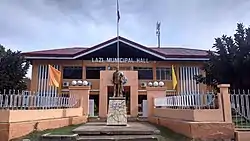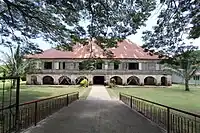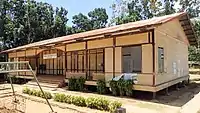Lazi | |
|---|---|
| Municipality of Lazi | |
 Lazi municipal hall | |
 Flag  Seal | |
 Map of Siquijor with Lazi highlighted | |
OpenStreetMap | |
.svg.png.webp) Lazi Location within the Philippines | |
| Coordinates: 9°07′41″N 123°38′02″E / 9.128°N 123.634°E | |
| Country | Philippines |
| Region | Central Visayas |
| Province | Siquijor |
| District | Lone district |
| Founded | 1857 |
| Barangays | 18 (see Barangays) |
| Government | |
| • Type | Sangguniang Bayan |
| • Mayor | Phil Moore D. Largo (PDPLBN) |
| • Vice Mayor | Rose Mae B. Dalaygon (PDPLBN) |
| • Representative | Zaldy S. Villa |
| • Municipal Council | Members |
| • Electorate | 16,139 voters (2022) |
| Area | |
| • Total | 70.64 km2 (27.27 sq mi) |
| Elevation | 28 m (92 ft) |
| Highest elevation | 599 m (1,965 ft) |
| Lowest elevation | 0 m (0 ft) |
| Population (2020 census)[3] | |
| • Total | 22,488 |
| • Density | 320/km2 (820/sq mi) |
| • Households | 5,654 |
| Economy | |
| • Income class | 4th municipal income class |
| • Poverty incidence | 20.30 |
| • Revenue | ₱ 142.8 million (2020) |
| • Assets | ₱ 287.8 million (2020) |
| • Expenditure | ₱ 109 million (2020) |
| • Liabilities | ₱ 51.52 million (2020) |
| Service provider | |
| • Electricity | Province of Siquijor Electric Cooperative (PROSIELCO) |
| Time zone | UTC+8 (PST) |
| ZIP code | 6228 |
| PSGC | |
| IDD : area code | +63 (0)35 |
| Native languages | Cebuano Tagalog |
Lazi, officially the Municipality of Lazi (Cebuano: Lungsod sa Lazi; Tagalog: Bayan ng Lazi), is a 4th class municipality in the province of Siquijor, Philippines. According to the 2020 census, it has a population of 22,488 people.[3]
Lazi Church is currently in the tentative list for UNESCO World Heritage Sites under the Baroque Churches of the Philippines (Extension). A proposal has been suggested by scholars to make a separate UNESCO inclusion for "Old Centre of Lazi which includes the Lazi Church".
Lazi is 32 kilometres (20 mi) from Siquijor.
Geography
Barangays
Lazi is politically subdivided into 18 barangays. Each barangay consists of puroks and some have sitios.
| PSGC | Barangay | Population | ±% p.a. | |||
|---|---|---|---|---|---|---|
| 2020[3] | 2010[5] | |||||
| 076103001 | Campalanas | 9.8% | 2,215 | 1,873 | 1.69% | |
| 076103002 | Cangclaran | 2.7% | 598 | 533 | 1.16% | |
| 076103003 | Cangomantong | 5.0% | 1,130 | 924 | 2.03% | |
| 076103004 | Capalasanan | 5.7% | 1,286 | 1,214 | 0.58% | |
| 076103005 | Catamboan (Pob.) | 8.0% | 1,809 | 1,617 | 1.13% | |
| 076103006 | Gabayan | 9.3% | 2,097 | 1,934 | 0.81% | |
| 076103007 | Kimba | 3.7% | 828 | 657 | 2.34% | |
| 076103008 | Kinamandagan | 4.6% | 1,039 | 922 | 1.20% | |
| 076103009 | Lower Cabangcalan | 4.7% | 1,053 | 866 | 1.97% | |
| 076103010 | Nagerong | 6.9% | 1,562 | 1,313 | 1.75% | |
| 076103011 | Po‑o | 3.3% | 746 | 711 | 0.48% | |
| 076103012 | Simacolong | 9.4% | 2,120 | 1,801 | 1.64% | |
| 076103013 | Tagmanocan | 4.1% | 930 | 853 | 0.87% | |
| 076103014 | Talayong | 2.9% | 661 | 608 | 0.84% | |
| 076103015 | Tigbawan (Pob.) | 7.3% | 1,642 | 1,696 | −0.32% | |
| 076103016 | Tignao | 4.3% | 957 | 887 | 0.76% | |
| 076103017 | Upper Cabangcalan | 3.4% | 770 | 658 | 1.58% | |
| 076103018 | Ytaya | 4.6% | 1,045 | 957 | 0.88% | |
| Total | 22,488 | 20,024 | 1.17% | |||
Climate
| Climate data for Lazi, Siquijor | |||||||||||||
|---|---|---|---|---|---|---|---|---|---|---|---|---|---|
| Month | Jan | Feb | Mar | Apr | May | Jun | Jul | Aug | Sep | Oct | Nov | Dec | Year |
| Mean daily maximum °C (°F) | 29 (84) |
30 (86) |
31 (88) |
32 (90) |
31 (88) |
30 (86) |
30 (86) |
30 (86) |
30 (86) |
29 (84) |
29 (84) |
29 (84) |
30 (86) |
| Mean daily minimum °C (°F) | 22 (72) |
22 (72) |
22 (72) |
23 (73) |
24 (75) |
24 (75) |
24 (75) |
24 (75) |
24 (75) |
24 (75) |
23 (73) |
23 (73) |
23 (74) |
| Average precipitation mm (inches) | 26 (1.0) |
22 (0.9) |
28 (1.1) |
41 (1.6) |
95 (3.7) |
136 (5.4) |
147 (5.8) |
126 (5.0) |
132 (5.2) |
150 (5.9) |
98 (3.9) |
46 (1.8) |
1,047 (41.3) |
| Average rainy days | 7.5 | 6.7 | 8.9 | 10.4 | 21.6 | 25.6 | 26.3 | 25.0 | 24.1 | 26.2 | 19.2 | 12.1 | 213.6 |
| Source: Meteoblue[6] | |||||||||||||
Demographics
| Year | Pop. | ±% p.a. |
|---|---|---|
| 1903 | 9,658 | — |
| 1918 | 13,161 | +2.08% |
| 1939 | 15,157 | +0.67% |
| 1948 | 13,840 | −1.00% |
| 1960 | 13,288 | −0.34% |
| 1970 | 14,875 | +1.13% |
| 1975 | 16,049 | +1.54% |
| 1980 | 16,149 | +0.12% |
| 1990 | 16,672 | +0.32% |
| 1995 | 16,339 | −0.38% |
| 2000 | 18,314 | +2.48% |
| 2007 | 19,440 | +0.83% |
| 2010 | 20,024 | +1.08% |
| 2015 | 20,490 | +0.44% |
| 2020 | 22,488 | +1.85% |
| Source: Philippine Statistics Authority[7][5][8][9] | ||
Economy
Education
The public schools in the town of Lazi are administered by two school districts under the Schools Division of Siquijor.
Elementary schools:
- Cadoldolan Elementary School — Sitio Cadoldolan, Campalanas
- Campalanas Elementary School — Campalanas
- Cangclaran Elementary School — Cangclaran
- Cangomantong Elementary School — Cangomantong
- Capalasanan Elementary School — Capalasanan
- Dapdap Elementary School — Lower Cabangcalan
- Gabayan Elementary School — Gabayan
- Kimba Elementary School — Kimba
- Kinamandagan Elementary School — Kinamandagan
- Lazi Central Elementary School — Catamboan
- Po-o Elementary School — Po-o
- Simacolong Elementary School — Simacolong
- Tagmanocan Elementary School — Tagmanocan
- Tignao Elementary School — Tignao
- Ytaya Elementary School — Ytaya
High schools:
- Campalanas National High School — Campalanas
- Kinamandagan High School — Kinamandagan
- Lazi National Agricultural School — Tigbawan
- Leon Parami High School — Po-o
Gallery
 San Isidro Labrador Convent
San Isidro Labrador Convent The century-old Enchanted Balete Tree
The century-old Enchanted Balete Tree The wooden Gabaldon school
The wooden Gabaldon school Cambugahay Falls
Cambugahay Falls
References
- ↑ Municipality of Lazi | (DILG)
- ↑ "2015 Census of Population, Report No. 3 – Population, Land Area, and Population Density" (PDF). Philippine Statistics Authority. Quezon City, Philippines. August 2016. ISSN 0117-1453. Archived (PDF) from the original on May 25, 2021. Retrieved July 16, 2021.
- 1 2 3 Census of Population (2020). "Region VII (Central Visayas)". Total Population by Province, City, Municipality and Barangay. Philippine Statistics Authority. Retrieved July 8, 2021.
- ↑ "PSA Releases the 2018 Municipal and City Level Poverty Estimates". Philippine Statistics Authority. December 15, 2021. Retrieved January 22, 2022.
- 1 2 Census of Population and Housing (2010). "Region VII (Central Visayas)" (PDF). Total Population by Province, City, Municipality and Barangay. National Statistics Office. Retrieved June 29, 2016.
- ↑ "Lazi: Average Temperatures and Rainfall". Meteoblue. Retrieved April 28, 2020.
- ↑ Census of Population (2015). "Region VII (Central Visayas)". Total Population by Province, City, Municipality and Barangay. Philippine Statistics Authority. Retrieved June 20, 2016.
- ↑ Censuses of Population (1903–2007). "Region VII (Central Visayas)". Table 1. Population Enumerated in Various Censuses by Province/Highly Urbanized City: 1903 to 2007. National Statistics Office.
{{cite encyclopedia}}: CS1 maint: numeric names: authors list (link) - ↑ "Province of Siquijor". Municipality Population Data. Local Water Utilities Administration Research Division. Retrieved December 17, 2016.
- ↑ "Poverty incidence (PI):". Philippine Statistics Authority. Retrieved December 28, 2020.
- ↑ "Estimation of Local Poverty in the Philippines" (PDF). Philippine Statistics Authority. November 29, 2005.
- ↑ "2003 City and Municipal Level Poverty Estimates" (PDF). Philippine Statistics Authority. March 23, 2009.
- ↑ "City and Municipal Level Poverty Estimates; 2006 and 2009" (PDF). Philippine Statistics Authority. August 3, 2012.
- ↑ "2012 Municipal and City Level Poverty Estimates" (PDF). Philippine Statistics Authority. May 31, 2016.
- ↑ "Municipal and City Level Small Area Poverty Estimates; 2009, 2012 and 2015". Philippine Statistics Authority. July 10, 2019.
- ↑ "PSA Releases the 2018 Municipal and City Level Poverty Estimates". Philippine Statistics Authority. December 15, 2021. Retrieved January 22, 2022.
External links
 Media related to Lazi at Wikimedia Commons
Media related to Lazi at Wikimedia Commons- Lazi Profile at PhilAtlas.com
- Philippine Standard Geographic Code